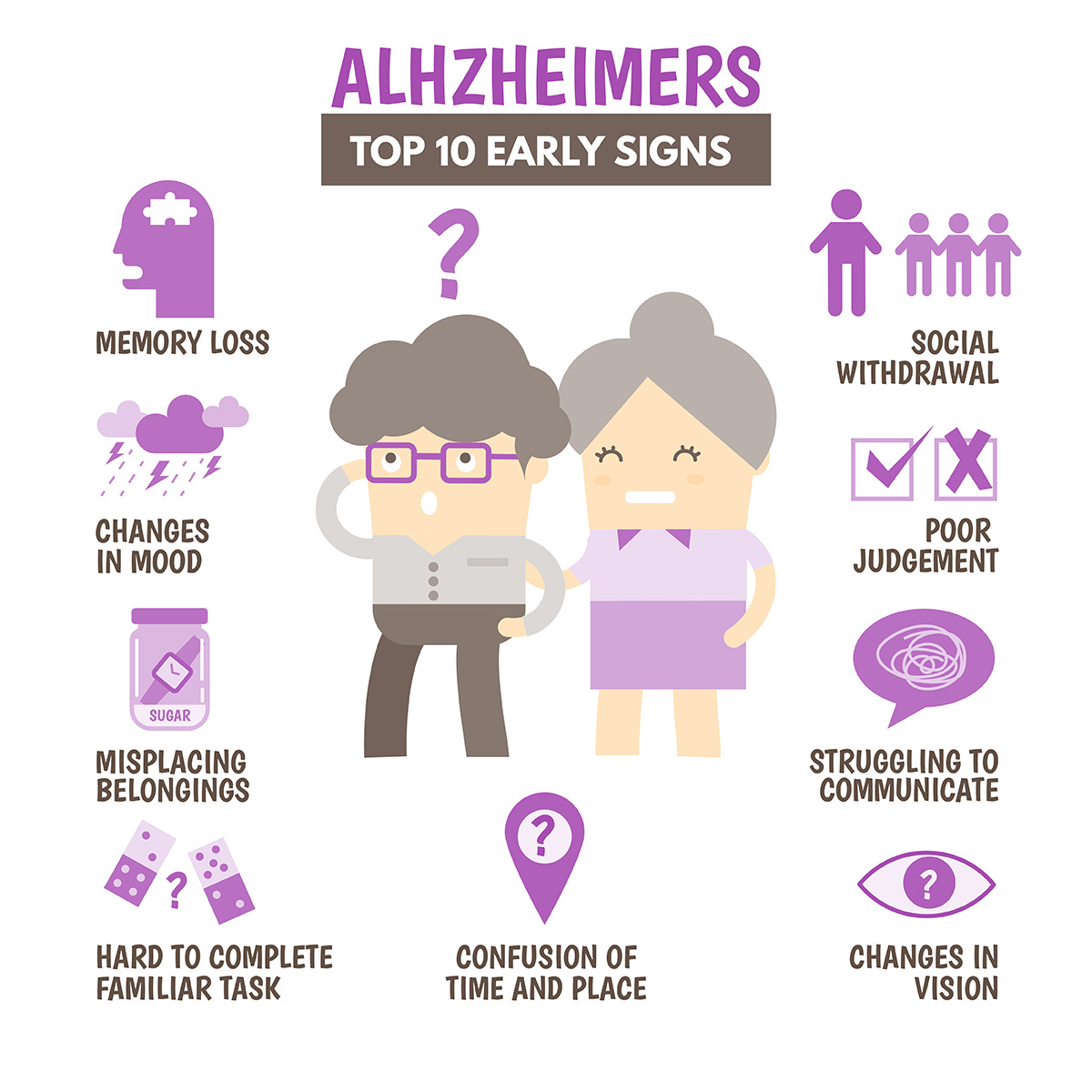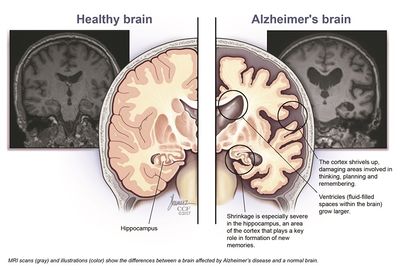Is There Hope for a Cure for Frontotemporal Dementia?
Is There Hope for a Cure for Frontotemporal Dementia?
Blog Article
Recognizing the Influence of Dementia on Life and Caregiving
Mental deterioration affects everyday life in extensive ways, influencing not just those diagnosed yet also their caregivers. As cognitive decrease advances, you could notice adjustments in communication and routine that obstacle both parties.
The Stages of Mental Deterioration and Their Results on Every Day Life
As you browse the trip of dementia, recognizing its phases can substantially impact exactly how you take care of life. Dementia typically advances with 3 main phases: early, center, and late. In the early stage, you may observe periodic memory gaps or difficulty locating the best words. This can bring about disappointment, however recognizing these signs early aids you adjust your regular and look for support.
Throughout the center stage, you'll experience much more noticeable cognitive decline. Daily tasks might become difficult, and maintaining your freedom may require modifications. Utilizing tips and streamlining your atmosphere can assist.
In the late stage, individuals usually require substantial help with day-to-day tasks. Planning for treatment comes to be essential, concentrating on comfort and lifestyle. By comprehending these stages, you're better equipped to respond proactively, guaranteeing you or your enjoyed one can browse the obstacles with self-respect and elegance.

Adjustments in Communication and Social Interaction
Exactly how do modifications in interaction impact your day-to-day interactions as dementia advances? As mental deterioration advances, you might discover that straightforward conversations end up being tough. Words may leave you, or you might struggle to locate the appropriate phrases. This can bring about aggravation for both you and your liked ones. Nonverbal hints, like gestures or facial expressions, become progressively vital.
You may discover it much easier to link with these ways rather of depending exclusively on talked language. Paying attention skills can also transform; you may locate it tougher to bear in mind or comply with conversations what was simply said (Vascular Dementia). This can lead to misconceptions or feelings of seclusion
Encouraging persistence and creating an encouraging atmosphere can aid. Taking part in tasks that foster connection, like songs or art, can enhance social interactions. Remember, preserving connections is still feasible; it's practically adapting to brand-new means of communicating.
Effect on Daily Routines and Activities
While maneuvering daily routines, you'll likely notice that tasks you once finished effortlessly ended up being extra tough as mental deterioration proceeds. You could locate yourself neglecting actions in acquainted regimens or having a hard time to recall where you placed items.
Planning your day can really feel frustrating, making it more challenging to stay with a timetable. You might need tips for appointments or to take medicines. Adapting your environment can help; for instance, labeling items or making use of lists can streamline jobs. Participating in recurring, organized tasks can likewise give convenience and a feeling of accomplishment. Remember, it's okay to request for aid. Bordering yourself with supportive buddies or family members can make managing these modifications a little bit less complicated.
Emotional and Behavior Difficulties
Steering with daily routines can produce not just sensible difficulties, yet likewise psychological and behavioral ones. You could discover adjustments in mood, such as raised anxiousness or frustration, which can come from confusion or trouble in finishing jobs. As you navigate these minutes, it is vital to acknowledge that your loved one may share their feelings with actions like agitation or withdrawal.
These psychological feedbacks can be unforeseeable and may arise without warning, leaving you both sensation bewildered. You might find that familiar atmospheres or routines can help in reducing anxiousness, but maintaining perseverance becomes considerable. It is very important to validate their feelings, also if you do not completely recognize them.
The Duty of Caregivers in Supporting Individuals With Dementia
As a caretaker, you play a necessary duty in providing emotional assistance for individuals with dementia. Developing everyday treatment regimens can develop a sense of security and convenience, aiding to reduce their anxiety. By understanding their requirements and utilizing efficient strategies, you can substantially boost their lifestyle.
Psychological Assistance Approaches
When caring for someone with mental deterioration, recognizing the psychological landscape is essential for offering effective support. You'll often find that perseverance and empathy go a long way. Validate their sensations; if they share complication or stress, recognize it without disregarding their emotions. Simple gestures, like holding their hand or keeping eye call, can produce a feeling of protection. Attempt to engage in activities that they enjoy, as this can stimulate happiness and connection. Bear in mind to interact clearly and gradually, making use of a tranquil tone. Motivate expression through songs or art, which can work as a powerful electrical outlet. Inevitably, don't forget to take treatment of your own emotional demands; looking for assistance on your own can improve your ability to look after them.
Daily Treatment Routines
Establishing everyday care regimens is crucial for offering security and comfort to individuals with mental deterioration, as these routines can aid reduce complication and stress and anxiety. You can begin by outlining a regular schedule for meals, tasks, and rest. This predictability assists your enjoyed one feel a lot more secure and engaged.
Integrate acquainted tasks, like folding laundry or watering plants, which can stimulate positive memories and promote a feeling of success. Use visual signs, such as calendars or checklists, to lead them through the day.
Be flexible, though; adapt regimens as required based on their state of mind or energy degrees. Fall Risk. Keep in mind, your patience and understanding are crucial in steering their altering demands, guaranteeing they feel sustained and valued throughout their every day life
Developing a Safe and Comfy Living Atmosphere
Producing a comfy and risk-free living atmosphere is vital for individuals with dementia. You'll want to make home security adjustments that minimize dangers and ensure knowledge to give a feeling of convenience. By concentrating on these elements, you can assist produce an area that supports both security and wellness.
Home Security Adjustments
As you navigate the challenges of dementia, making home safety modifications can considerably go right here improve convenience and security. Beginning by getting rid of tripping dangers like rugs and clutter, assuring sidewalks are clear. Install grab bars in bathrooms and non-slip floor coverings in the shower to avoid drops. Think about utilizing brighter lighting and evening lights to enhance presence, particularly during nighttime. Tag crucial areas, such as the bathroom and cooking area, with clear indications to aid with positioning. Protect any sharp things or harmful substances unreachable. Furthermore, evaluate your home's alarm systems and locks to confirm they're user-friendly and provide satisfaction. These modifications not just promote safety and security however also encourage self-reliance, allowing your enjoyed one to feel more this secure in their environment.
Comfort and Familiarity
After making sure a secure environment with essential alterations, cultivating convenience and experience is essential for individuals with mental deterioration. Keep a constant routine to help them feel based and minimize anxiety. Engaging in acquainted tasks, such as listening to songs or horticulture, can improve their sense of belonging, making their living setting a real refuge.
Approaches for Efficient Caregiving and Support
While steering the difficulties of dementia care can really feel frustrating, carrying out efficient techniques can greatly boost both the caretaker's and the client's daily experience. Begin by establishing a regimen; predictability helps in reducing stress and anxiety for both you and your enjoyed one. Usage clear, basic interaction-- direct inquiries and short sentences can prevent complication.

Do not neglect to care for yourself; schedule breaks and get in touch with assistance teams. Sharing experiences with others in similar situations can offer valuable understandings and psychological relief.
Lastly, continue to be individual and adaptable. Dementia can bring uncertain modifications, so adapting your approach is important. By employing these techniques, you can cultivate a much more positive environment that profits both get more you and your liked one.
Often Asked Inquiries

What Are the Different Types of Dementia?
You'll find a number of sorts of dementia, including Alzheimer's, vascular mental deterioration, Lewy body dementia, and frontotemporal dementia. Each type affects memory and cognitive function in a different way, so recognizing the differences is essential for appropriate diagnosis and care.
Just How Can I Aid A Person With Early-Stage Mental Deterioration?
You can assist someone with early-stage dementia by holding your horses, providing support, and encouraging them to engage in tasks they appreciate. Maintaining routines consistent and maintaining open interaction can also make a considerable difference in their day-to-day life.
Exist Financial Resources Available for Dementia Care?
Yes, there are funds offered for dementia care. You can check out entitlement program programs, nonprofit companies, and insurance coverage options. It's additionally smart to seek advice from local agencies for specific sources tailored to your situation.
What Lawful Considerations Should Caregivers Recognize?
As a caretaker, you ought to take into consideration power of attorney, health care proxies, and guardianship legislations. It's essential to recognize the lawful rights and responsibilities you hold, guaranteeing your liked one receives suitable care and defense.
How Can I Deal With Caretaker Anxiety?
You can manage caretaker tension by focusing on self-care, seeking assistance from close friends or teams, setting sensible expectations, taking breaks, and practicing leisure techniques. Keep in mind, your health matters equally as much as the individual you're caring for.
Comprehending the Effect of Mental Deterioration on Daily Life and Caregiving.
As you navigate the trip of mental deterioration, understanding its stages can significantly influence how you handle day-to-day life.While maneuvering everyday regimens, you'll likely notice that tasks you when finished easily become much more difficult as mental deterioration proceeds.Developing daily care routines is important for giving stability and comfort to individuals with mental deterioration, as these regimens can help decrease confusion and stress and anxiety.While steering the challenges of dementia treatment can really feel frustrating, implementing efficient methods can substantially improve both the caretaker's and the person's daily experience.
Report this page